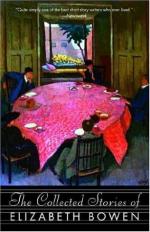|
This section contains 6,317 words (approx. 22 pages at 300 words per page) |

|
SOURCE: "Elizabeth Bowen: The House, the Hotel & and the Child," in The New Criterion, Vol. 13, No. 4, December, 199, pp. 24-33.
In the following essay, Tillinghast traces biographical influences in Bowen's fiction as allegories of innocence and experience, noting in particular the importance of displacement and abandonment among her characters.
To read Elizabeth Bowen is to enter, both with pleasure and with consternation, the world of the Anglo-Irish: that spiritually hyphenated class which has all but vanished from Ireland since the Easter Rebellion of 1916 and the foundation of the Republic. As a British Protestant ruling class which owned land taken by force from the Irish Catholic population, the Anglo-Irish were always, from the sixteenth century on, to some degree rootless and insecure in the country they governed. But the Land Wars and legislation of the late nineteenth century set into motion forces that would soon deprive the Protestant land-owning classes...
|
This section contains 6,317 words (approx. 22 pages at 300 words per page) |

|


